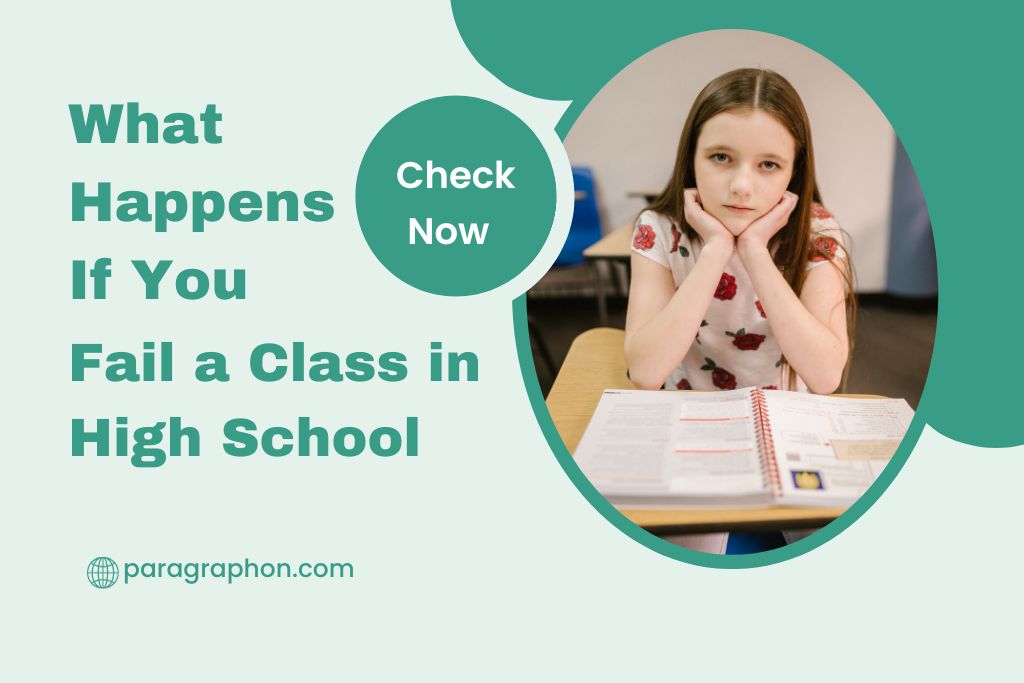High school is a crucial period in a student’s life, laying the foundation for their future academic and professional endeavors. However, it’s not uncommon for students to face challenges that can lead to failing a class. In this blog post, we’ll explore what happens if you fail a class in high school, understand the consequences, delve into the reasons behind it, and provide strategies to prevent and overcome failure.
Understanding the Consequences
- Impact on GPA: Failing a high school class can significantly impact your grade point average (GPA). GPA is an essential metric for college admissions and scholarships. A lower GPA may limit your options for higher education.
- Graduation Requirements: Many high schools have specific course requirements for graduation. Failing a class could mean not meeting these requirements, potentially delaying your graduation.
- College Admissions: Colleges and universities typically review high school transcripts as part of their admission process. A failing grade can raise red flags for admissions committees and affect your chances of getting into your preferred institution.
- Future Career Prospects: Your high school performance can also influence your future career prospects. Some jobs and professions may require a minimum level of education or specific courses, and failing a class can hinder your progress.
| Also Read: Exploring the 4 Types of Leadership Styles with Examples |
Why Students Fail In High School
- Lack of Understanding or Interest in the Subject: Sometimes, students struggle with a particular subject because they find it challenging or lack interest. Failing to grasp fundamental concepts can lead to poor performance.
- Poor Time Management and Study Skills: Effective time management and study skills are essential for success in high school. Procrastination, distractions, and a lack of study strategies can all contribute to failing grades.
- Personal Challenges: Students face personal challenges such as health issues, family problems, or emotional struggles that can affect their academic performance. These issues may require support and understanding from teachers and parents.
- Procrastination: Procrastination is a common problem among high school students. Delaying assignments and studying until the last minute can lead to rushed and inadequate work, resulting in failure.
20 Consequences Happen: What Happens If You Fail A Class In High School
- Grade Retention: You may be required to repeat the class the following year or during summer school.
- Lower GPA: Your grade point average (GPA) will decrease, which can impact your overall academic record.
- Course Repetition: You may need to retake the class in a future semester or year to fulfill graduation requirements.
- Credit Loss: If the class is a graduation requirement, failing it may delay your graduation or prevent you from receiving a diploma.
- Academic Probation: Some schools place students who fail classes on academic probation, which could have further consequences if additional classes are failed.
- Summer School: You might need to attend summer school to make up for the failed class and receive credit.
- Loss of Electives: Failing a core subject may limit your ability to take elective courses of your choice.
- College Applications: A failing grade can negatively impact your college applications, especially if it’s in a core subject or a prerequisite for your intended major.
- Scholarship Eligibility: Scholarships often require a minimum GPA, and failing a class can make you ineligible for certain scholarships.
- Transcript Impact: Failing grades are recorded on your transcript, which colleges and potential employers may review.
- Limited Extracurricular Activities: Some schools have GPA requirements for participation in extracurricular activities, so failing a class may affect your eligibility.
- Loss of Trust: Your teachers and parents may lose trust in your commitment to academics, which can affect your relationships and support system.
- Increased Stress: Failing a class can lead to stress and anxiety, which may affect your overall well-being.
- Reputation: Your academic performance can impact your reputation among peers and teachers.
- Limited Course Selection: Failing a prerequisite class may limit your ability to take advanced courses in the same subject.
- Parental Consequences: Your parents or guardians may impose consequences, such as restrictions on privileges or additional academic support.
- Impact on Graduation Requirements: Failing a class may mean you need to take additional courses to meet graduation requirements.
- Career Goals: Failing a class in a subject related to your career goals could hinder your future prospects.
- Self-Esteem: It can negatively affect your self-esteem and confidence in your academic abilities.
- Long-Term Consequences: Failing multiple classes or consistently struggling academically in high school may have long-term consequences for your education and career opportunities.
Strategies to Prevent Failure
Seeking Help from Teachers or Tutors:
If you’re struggling with a subject, don’t hesitate to ask for help. Teachers, tutors, and peer support can provide valuable assistance and clarification on challenging topics.
Developing Effective Study Habits:
Establish a study routine that works for you. Break down your study sessions into manageable chunks, stay organized, and use study aids like flashcards or online resources.
Setting Realistic Goals and Expectations:
It’s crucial to set realistic goals and expectations for yourself. Understand your strengths and weaknesses, and don’t overextend by taking on too many courses or extracurricular activities.
Managing Time Wisely:
Time management is key to success. Create a schedule that allocates time for studying, homework, and relaxation. Avoid procrastination by setting deadlines for tasks.
Remedial Options For What Happens If You Fail A Class In High School
- Summer School: Some schools offer summer school programs where you can retake a failed class to make up for the grade.
- Credit Recovery Programs: Credit recovery programs provide an opportunity to retake specific portions of a class to earn a passing grade.
- Retaking the Course: If your school doesn’t offer credit recovery or summer school, you may have the option to retake the entire class in the following academic year.
- Online Courses: Online courses and tutoring platforms offer flexible options for catching up on coursework and improving your understanding of the subject.
Communicating with Parents and Teachers
Open communication with parents and teachers is vital when facing academic challenges (or What Happens If You Fail A Class In High School).
Discussing Challenges and Seeking Support:
Talk to your parents or guardians about the difficulties you’re facing in school. They can provide emotional support and help you find resources to improve.
Setting Up Regular Progress Meetings:
Establish a line of communication with your teachers. Attend parent-teacher conferences and ask for feedback on your performance. Regular check-ins can help you stay on track.
How To Cope Up with Failure?
- Avoiding Self-Blame and Negative Self-Talk: It’s essential to remember that failing a class doesn’t make you a failure as a person. Avoid self-blame and negative self-talk. Instead, focus on learning from the experience.
- Learning from Mistakes and Moving Forward: Failure is a part of life, and it can provide valuable lessons. Use the experience as an opportunity to assess what went wrong, adjust your approach, and work towards improvement.
Conclusion
Failing a class in high school can be a challenging experience, but it’s not the end of the world. Understanding the consequences, identifying the reasons behind failure, and implementing strategies to prevent it are essential steps to take.
Remember that seeking help and maintaining open communication with teachers and parents can make a significant difference. Coping with failure is a vital life skill that can help you overcome obstacles and succeed in the future. With the right mindset and support, you can turn a setback into an opportunity for growth and personal development.
Hope you learn all the consequences about what happens if you fail a class in high school.

